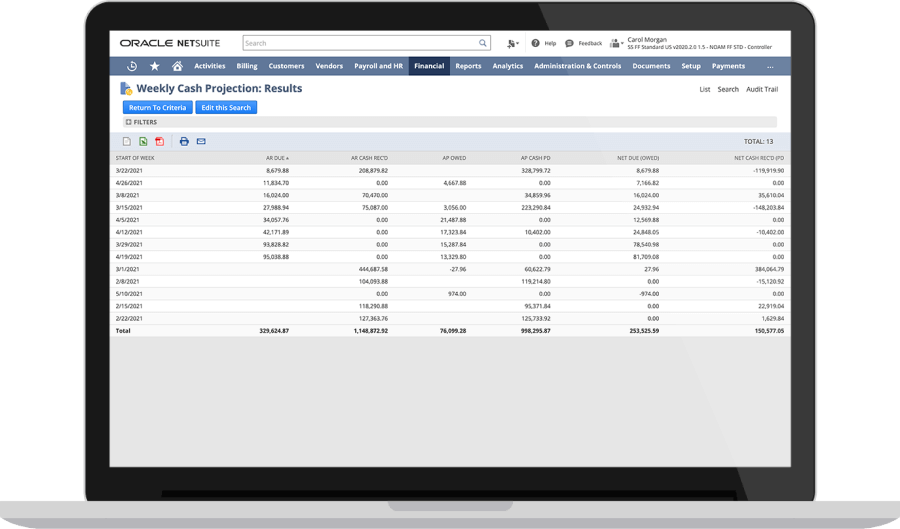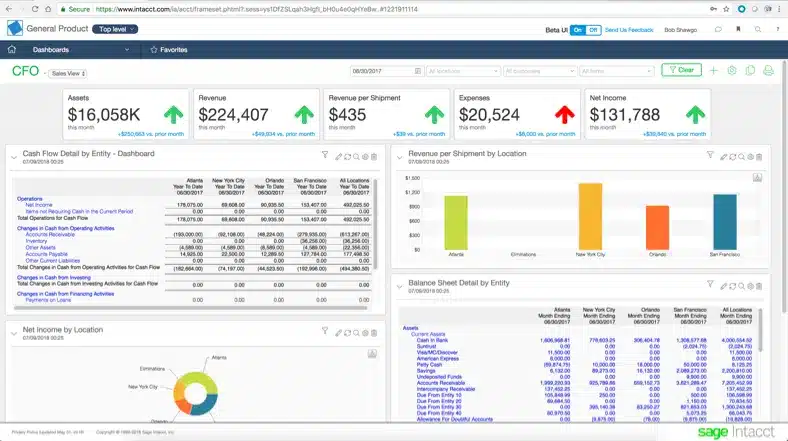NetSuite Accounting Software pricing varies. It depends on several factors.
Usually, costs include licenses, modules, and user numbers. Understanding NetSuite’s pricing can seem complex. It changes with your business size and needs. Small businesses may find it affordable. Larger companies might see higher costs. NetSuite offers various packages. These adapt to different financial requirements.
Basic packages cover essential accounting features. Advanced ones include more tools. This flexibility helps businesses manage finances effectively. In this blog, we’ll explore NetSuite pricing in detail. We will break down the factors affecting costs. This will help you determine if NetSuite fits your budget. Stay tuned to learn more.
Introduction To Netsuite Pricing
NetSuite is a popular cloud-based ERP solution. Businesses use it for financial management, CRM, and e-commerce. Understanding its pricing is crucial for budget planning. This guide explains the cost factors and what you can expect to pay.
Overview Of Netsuite
NetSuite offers a comprehensive suite of applications. These applications help businesses manage their operations. NetSuite is known for its flexibility and scalability.
Its main modules include:
- Financial Management
- Customer Relationship Management (CRM)
- Inventory Management
- E-commerce
Each module can be customized to fit specific business needs. This makes NetSuite a versatile option for many industries.
Factors Influencing Cost
The cost of NetSuite varies based on several factors. Understanding these factors can help you estimate your expenses.
1. Number of Users: The more users, the higher the cost. NetSuite charges per user, making user count a significant cost driver.
2. Modules Required: Different businesses need different modules. More modules increase the overall cost.
3. Customization: Customizing NetSuite to fit your business needs can add to the cost. Customizations require time and expertise.
4. Implementation: Implementing NetSuite involves setup and training. Professional services for implementation can be costly.
5. Support and Maintenance: Ongoing support and maintenance are essential. These services also contribute to the overall cost.
| Factor | Description |
|---|---|
| Number of Users | Charges per user increase total cost |
| Modules Required | More modules mean higher expense |
| Customization | Tailoring NetSuite adds to cost |
| Implementation | Setup and training require investment |
| Support and Maintenance | Ongoing services affect pricing |
Understanding these factors helps in planning and budgeting. Carefully evaluate your business needs to determine the best fit.
Subscription Plans
Choosing the right subscription plan for NetSuite Accounting Software is essential. It helps businesses of all sizes manage their finances efficiently. Here, we break down the different plans available to help you decide which is the best fit for your needs.
Basic Plan
The Basic Plan is ideal for small businesses. It offers essential features to get you started with accounting.
- General Ledger
- Accounts Payable
- Accounts Receivable
- Bank Reconciliation
This plan provides core functionalities at an affordable rate. It ensures you can manage your financial operations without breaking the bank.
Advanced Plan
The Advanced Plan is tailored for medium to large businesses. It includes all the features of the Basic Plan plus more advanced tools.
- Expense Management
- Advanced Financial Reporting
- Inventory Management
- Multi-Currency Support
This plan offers comprehensive solutions for complex accounting needs. It helps businesses streamline their operations and improve efficiency.
| Feature | Basic Plan | Advanced Plan |
|---|---|---|
| General Ledger | Included | Included |
| Accounts Payable | Included | Included |
| Accounts Receivable | Included | Included |
| Bank Reconciliation | Included | Included |
| Expense Management | Not Included | Included |
| Advanced Financial Reporting | Not Included | Included |
| Inventory Management | Not Included | Included |
| Multi-Currency Support | Not Included | Included |
Each plan is designed to cater to specific business needs. Consider your business size and requirements before making a decision.
User Licenses
Understanding the cost of user licenses is crucial for budgeting for NetSuite accounting software. The price varies based on the type of license and the number of users.
Types Of Licenses
NetSuite offers different types of licenses to fit various business needs. Here are the main types:
- Full User License: Ideal for employees who need complete access.
- Employee Self-Service License: Suitable for employees who only need limited access.
- Read-Only License: Allows users to view data without making changes.
Cost Per User
The cost per user can vary depending on the license type and the number of users. Here is a basic breakdown:
| License Type | Cost per User (Monthly) |
|---|---|
| Full User License | $99 – $129 |
| Employee Self-Service License | $10 – $20 |
| Read-Only License | $5 – $10 |
Bulk purchases often come with discounts, making it more affordable for larger teams. Always consider your specific needs before choosing a license type.
Add-on Modules
NetSuite Accounting Software offers a variety of add-on modules. These modules help customize your software to fit your business needs. Let’s dive into two important add-ons: Financial Management and Inventory Management.
Financial Management
The Financial Management module provides tools for managing finances. It offers features like budgeting, forecasting, and financial reporting. With this module, you can track your financial performance in real-time. It also ensures compliance with accounting standards. This helps your business stay on top of its financial health.
Inventory Management
The Inventory Management module helps you keep track of your inventory. It includes tools for order management, warehouse management, and product tracking. This module ensures you have the right products available at the right time. It also helps reduce excess inventory, cutting costs and improving efficiency. Your business can operate smoothly with better inventory control.
Implementation Costs
Implementing NetSuite Accounting Software involves several cost factors. These include initial setup fees, customization costs, and more. Understanding these costs helps in budgeting for the software. Below, we will explore the key components of implementation costs.
Initial Setup Fees
The initial setup fees cover the basic installation of NetSuite. It includes the costs for configuring the system according to your business needs. This step is crucial as it lays the foundation for all future operations.
Setup fees can vary based on the complexity of your business processes. Simple setups might cost less, while complex setups with multiple departments could be higher.
Customization Costs
Customization costs are an important part of implementation. Businesses often require custom features tailored to their specific needs. Customization ensures that NetSuite fits your business processes perfectly.
Customization costs can include:
- Custom Fields
- Custom Scripts
- Custom Reports
These customizations help in streamlining operations and improving efficiency. The more you customize, the higher the costs. It’s important to prioritize essential customizations to manage your budget effectively.

Credit: www.netsuite.com
Ongoing Maintenance
Ongoing Maintenance for NetSuite Accounting Software can be a crucial aspect to consider. Understanding the ongoing costs ensures you are prepared for the long-term investment. This section will explore the different aspects of ongoing maintenance, including Support Plans and Upgrade Fees.
Support Plans
NetSuite offers various Support Plans to meet different business needs. These plans typically include:
- Basic Support
- Premium Support
- Advanced Support
Each plan provides different levels of service. Basic Support is the most economical and includes essential support services. Premium Support offers faster response times and more personalized assistance. Advanced Support includes all Premium features plus additional proactive services.
The cost of each support plan varies. Basic Support is generally included with your subscription. Premium and Advanced Support come at an extra cost, usually calculated as a percentage of your annual subscription fee.
Upgrade Fees
NetSuite frequently releases updates to improve functionality and security. These updates may include:
- New Features
- Bug Fixes
- Security Enhancements
While many updates are included in your subscription, some major upgrades may incur additional fees. These upgrade fees cover the cost of implementing new features and ensuring compatibility with existing systems.
Planning for these upgrade fees is essential. They ensure your NetSuite software remains up-to-date and continues to meet your business needs. Understanding these potential costs helps you budget effectively for the long term.
Here is a summary of the potential ongoing costs for NetSuite:
| Cost Type | Description | Estimated Cost |
|---|---|---|
| Basic Support | Includes essential support services | Included in Subscription |
| Premium Support | Faster response times, personalized assistance | Extra cost, % of subscription |
| Advanced Support | All Premium features plus proactive services | Extra cost, % of subscription |
| Upgrade Fees | Major upgrades for new features | Additional cost |
Hidden Costs
When considering NetSuite accounting software, many only think about the base price. Yet, hidden costs can significantly impact the total expense. These hidden costs often surprise users who are new to the software. Understanding these costs can help in budgeting accurately.
Integration Fees
NetSuite often requires integration with other systems. These integrations are crucial for smooth operations. But, they do not come free. Integration fees can vary based on your specific needs. Custom integrations might cost more. It’s essential to budget for these expenses in advance.
Training Costs
Training is essential for using NetSuite effectively. Users need to understand the software to maximize its benefits. Training sessions can be costly. They involve time and money. Companies must invest in training to ensure their staff can use NetSuite efficiently. These costs can add up quickly. Planning for training expenses is crucial.

Credit: www.netsuite.co.uk
Cost-saving Tips
Managing costs is crucial when investing in NetSuite accounting software. There are several strategies to ensure you get the best value for your money. This section provides practical tips to help you save money while getting the most out of your NetSuite investment.
Negotiating Prices
One of the most effective ways to reduce costs is by negotiating prices. Don’t settle for the first quote you receive. Ask for a discount. Vendors may offer lower prices to secure your business. Consider negotiating the length of the contract. Longer commitments often lead to better rates. Be clear about your budget. Vendors may adjust their offer to fit within your financial limits.
Choosing Essential Features
NetSuite offers many features. But, you may not need them all. Identify the essential features for your business. Focus on these to avoid unnecessary costs. Customization can be expensive. Stick to standard functionalities that meet your needs. This approach saves money and simplifies implementation. Review your requirements regularly. Adjust your plan to include only the necessary features. This ensures you are not paying for tools you don’t use.

Credit: www.business.com
Conclusion
NetSuite Accounting Software offers varied pricing based on your needs. Costs depend on factors like user count and modules. It’s important to assess your business requirements first. Consult with a NetSuite representative for an accurate quote. This ensures you get the right features for your business.
Remember, investing in the right software can improve efficiency. So, take your time to make an informed decision. With NetSuite, you can streamline your accounting processes and focus on growth.


